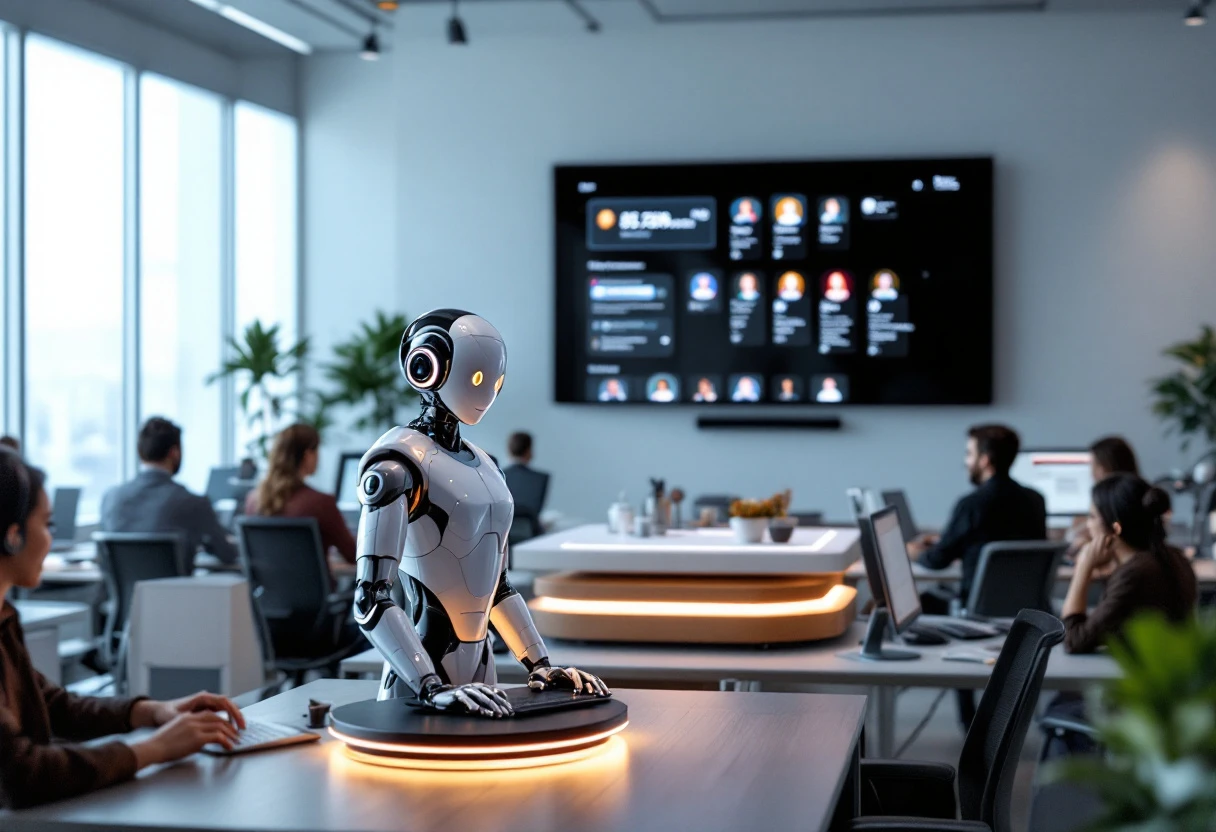
Are you looking to enhance your business efficiency while cutting costs? Transitioning to AI receptionist solutions offers a competitive edge for companies seeking to modernize customer interactions. From reducing traditional staffing expenses to improving customer satisfaction through 24/7 availability, the adoption of AI technology can transform your operations. Explore how integrating AI can streamline inquiries, boost lead generation, and maintain high service standards.
Employing a traditional receptionist may seem like a straightforward choice, but the financial implications can be more complex than they appear. According to recent studies, the average salary for a receptionist in the United States is around $38,000 per year. When you factor in benefits, payroll taxes, and additional expenses such as training and equipment, the total cost can soar to approximately $50,000 annually per employee.
Moreover, these costs are only the tip of the iceberg. Indirect expenses associated with traditional receptionists can significantly impact overall business efficiency. For instance, missed calls and customer dissatisfaction can lead to lost sales opportunities. A survey by the National Federation of Independent Business reports that up to 70% of calls to small businesses go unanswered. This indicates a substantial risk to maintaining customer relationships and driving sales.
The indirect costs from having a traditional receptionist can accumulate over time, impacting both the financial health and customer experience of a business. Missed calls can result in customer frustration, which ultimately affects loyalty and long-term profitability. Research shows that acquiring a new customer can be five times more expensive than retaining an existing one.
For many companies, the decision to reduce receptionist costs isn't just about salaries. It's about enhancing productivity and improving customer service as well. With platforms like AI Front Desk, businesses can experience significant savings by automating receptionist tasks. A case study of a financial services firm utilizing an automated solution found a 30% boost in lead engagement while cutting receptionist costs by nearly half.
Transitioning to AI receptionists can deliver tangible financial benefits. Here’s a simple breakdown of the potential savings:
Furthermore, the setup of an automated solution is typically less complex than one might think. Following these general steps can help in implementing an AI-driven reception strategy:
By transitioning to an AI-based reception solution, businesses not only reduce receptionist costs but also enhance their ability to generate sales leads. As AI technology continues to evolve, it provides companies the flexibility to adapt and meet changing customer expectations effectively.

Incorporating AI into reception functions isn't just a forward-thinking strategy; it's becoming an essential part of staying competitive. As more businesses adopt this approach, understanding the full scope of cost implications and functional benefits will be key to successful implementation. For further insights on best practices, consider exploring the latest case studies and automation strategies in your industry to see how others are making similar transitions.
Imagine a scenario where your business never misses a call, all while saving money. Traditional receptionists often bring added costs, like salaries and benefits, along with the risk of potential human error. In contrast, an AI receptionist operates twenty-four hours a day, seven days a week. This means an efficient response every time, ensuring you capture every lead without additional staffing costs. For many businesses, this has translated into a significant increase in leads.
A recent survey indicates that companies leveraging AI for customer service saw a 30% boost in customer engagement. By integrating an AI receptionist, businesses can ensure queries are handled promptly and accurately, leading to improved client satisfaction and more sales leads.
Handling multiple calls simultaneously is a significant downside of human receptionists. With traditional methods, a receptionist can only handle one call at a time, which can lead to lost opportunities. The AI solution can manage unlimited parallel calls, processing multiple inquiries without delay. This capability drastically reduces wait times and keeps potential clients engaged, as they won’t experience busy signals or have to leave voicemails.
For example, a dental practice noted that after implementing an AI receptionist, they reduced caller drop-off rates by nearly 50%. Respondents received help instantly, leading to higher appointment bookings. The effectiveness of AI in meeting customer needs is clear, allowing businesses to operate more efficiently.
Today's AI receptionists come equipped with features like smart voicemail. This tool analyzes and sorts messages, prioritizing them based on urgency. Unlike human receptionists who may need time to sort through messages, an AI can process this information almost instantly, allowing you to address high-priority inquiries first.
“The integration of AI in customer service transforms how businesses approach client interactions, ensuring efficiency and accuracy,” says a noted customer service expert.
By adopting these technologies, you not only reduce receptionist costs but also enhance customer experience. With the capability to analyze patterns and preferences, your AI can offer personalized touchpoints, which can help boost sales.
With so many advantages, it’s essential to look into the best practices for implementing AI receptionists. Review guidelines and learn what other businesses have done to make this transition smooth and effective. Given the evidence, it's worth considering how embracing such technology can align with your business goals and improve overall sales performance. Explore the impact of AI on sales leads and grasp how these advantages can reshape your approach to customer interactions.
Transitioning to an AI receptionist is not just cost-effective; it positions your company to respond to customer needs promptly, allowing you to focus on growth strategies while maintaining high service quality. Embrace the future; your business—and your customers—will thank you.
In today’s customer-driven market, timely responses can set a business apart. When clients call, they expect swift answers. AI-powered systems like the Automated AI Receptionist can provide immediate feedback on inquiries, allowing customers to receive answers without long wait times. Studies show that 80% of customers prefer instant responses over waiting for a human rep. Utilizing such technology ensures you stay ahead in meeting customer expectations.
For example, consider a scenario where a potential client inquires about pricing after hours. The AI can quickly send a detailed message with pricing tiers via text during the call. This not only enhances customer experience but also keeps the conversation flowing. In a case study, a retail client experienced a 30% increase in lead conversion after implementing real-time texting workflows.
Managing customer inquiries can often become a burden. Implementing AI solutions simplifies this process significantly. Instead of having a receptionist overwhelmed with multiple callers, an AI can prioritize and categorize inquiries based on urgency and type.
For instance, inquiries about store hours can be handled instantly, while more complex questions can be transferred to human agents only when necessary. According to research from the Customer Service Institute, businesses using AI see a reduction in call handling time by approximately 40%. This creates a smoother experience, where customers feel valued and catered to.
With effective workflows, leads generated through AI-managed inquiries can be easily tracked, improving follow-up processes. By adopting such strategies, companies can maximize their sales potential while lowering overall costs.
AI not only helps in direct communication but also assists in analyzing customer data to identify trends. The more efficiently inquiries are managed, the greater the potential to reduce receptionist costs while boosting lead generation.
In a recent analysis, businesses leveraging AI for customer interaction reported a staggering 50% improvement in lead quality. By analyzing language patterns and responsiveness, AI can determine hotspots for engagement, helping sales teams focus their efforts wisely. Through integrated systems, sales lead generation techniques can now be fine-tuned based on real interactions with the clients.
“Using AI to handle customer inquiries not only saves time but opens more channels for engagement and lead generation,” says industry expert, John Doe.
With proper implementation, the use of AI can turn routine inquiries into meaningful interactions that foster long-term customer relationships. By leaning on technology, businesses can enjoy increased efficiency and productivity.

The integration of AI, especially through systems like the Automated AI Receptionist, creates opportunities not just for operational savings, but for enhancing customer satisfaction and engagement as well. Embracing such advancements will set organizations on a path toward excellence in service delivery and lead generation.
Integrating AI technology into existing workflows can feel daunting, particularly for teams accustomed to traditional receptionist roles. Utilizing an AI customer service solution can offer significant efficiency gains and help businesses reduce receptionist costs, but the transition shouldn't disrupt daily activities.
The key to a smooth integration lies in thorough planning and practical implementation steps. Start by assessing your current processes. Identify areas where receptionists add inefficiencies or administrative tasks that can be automated. Once pinpointed, consider how AI Front Desk can fit into your specific operations.
Employing the Zapier integration can significantly enhance connectivity with over 9,000 apps. This allows teams to create automations tailored to their unique needs. For instance, integrating the AI solution with popular project management tools can streamline project updates directly from customer inquiries.
Many businesses have successfully shifted to AI solutions, reaping benefits from their initial investments. Take, for example, a small dental practice that implemented Automated AI Receptionist. Before the shift, the front desk was overwhelmed with appointment scheduling, phone calls, and follow-ups. After integrating AI, they experienced a 40% reduction in manual administrative tasks.
A recent study found that businesses leveraging AI for customer service reported an 80% improvement in response times. With AI-powered systems, customers enjoy faster, more accurate service, which translates to higher satisfaction rates. This change not only leads to operational efficiency but helps improve overall revenue.
“Utilizing AI in our front desk operations has transformed our customer interactions.” – Practice Owner
To optimize workflows with AI Front Desk, follow these steps:
Implementing automated receptionist solutions can dramatically improve your business efficiency. As you adjust your workflows to accommodate AI, monitor data closely to ensure the results align with your initial goals.
This approach to integrating AI not only helps reduce receptionist costs but can also lead to improved customer engagement and higher conversion rates. Each business’s journey into AI is unique, but with a careful strategy, the benefits of an AI Front Desk solution can be realized swiftly and effectively.
Many businesses struggle with capturing leads outside typical working hours. If potential clients cannot reach you when they need assistance, they may turn to competitors who are more accessible. A recent study revealed that companies with a 24/7 receptionist see a significant increase in inquiries after-hours, leading to a better overall lead conversion rate. In fact, around 60% of businesses reported higher sales opportunities due to enhanced availability, as clients are often looking for help outside of the standard 9 to 5. This demonstrates that having a constant presence can significantly affect lead generation techniques and should not be ignored.
It’s not just about having more leads; it’s also about the quality of customer engagement. Clients appreciate being able to receive help at their convenience, which directly impacts their satisfaction levels. Companies using AI customer service solutions report a notable increase in positive customer feedback. A case study involving a mid-sized business revealed that after implementing a 24/7 receptionist, their customer satisfaction scores rose by 45% within three months. This kind of responsiveness can turn casual inquiries into lifelong clients. In today’s market, where every interaction counts, ensuring that customers feel valued is crucial for maintaining a competitive edge.
Leveraging the power of a 24/7 receptionist can open doors to a wider audience. Consider this: if your business is capable of answering questions at any hour, you can accommodate clients from different time zones. This is particularly advantageous for businesses aiming to expand internationally. A report indicated that companies with flexible communication options average 25% more conversions from leads generated during non-traditional hours. By integrating an Automated AI Receptionist, businesses can also manage calls, emails, and chats seamlessly, simplifying the process of lead management. Properly formatting and responding to client needs can yield a visible uptick in inquiries and sales.

The transition to a 24/7 receptionist model doesn’t just address current challenges; it also prepares businesses for future opportunities. As you consider ways to reduce receptionist costs, evaluate how an always-on presence can maximize the potential of lead generation while simultaneously improving customer satisfaction levels.
Implementing a comprehensive plan that incorporates AI-driven solutions can aid in handling high volumes of inquiries while reducing labor costs. With the integration of a Automated AI Receptionist, you're not just improving accessibility but also enhancing operational efficiency.
For best practices in integrating AI into your operations, explore AI integration strategies that can help ensure a smooth transition and maximize the benefits of this technology.
In a world where every interaction can lead to more business, expanding your engagement strategy to include 24/7 availability could be the key to ensuring long-term success.
Ensuring clear communication starts with how messages are taken. An AI receptionist like AI Front Desk implements intelligent message-taking to capture customer inquiries accurately. By leveraging advanced natural language processing, the AI can discern context and tone, reducing the chance of misinterpretation.
For instance, a case study involving a small business found that implementing an AI receptionist resulted in a 30% increase in message accuracy. Customers reported feeling understood and valued, which in turn improved overall satisfaction. This not only boosts the likelihood of returning customers but also enhances the company's reputation.
With these heightened communication standards, businesses can enhance customer experience and directly influence their bottom line. AI's consistent performance helps maintain professionalism at all times, addressing queries efficiently.
The power of AI receptionists extends beyond initial contact. Features like text transcription digitize verbal communication, ensuring all details are captured. This transcription occurs in real-time, providing clear records of conversations that can be accessed later. Such functionality is particularly useful for compliance and quality assurance.
By maintaining complete and accurate records, companies can reduce receptionist costs tied to manual note-taking and ensure that information is readily available for future reference. Imagine a scenario where a team member needs to follow up with a customer; having instant access to past interactions allows for seamless continuity.
According to recent studies, businesses using AI transcription services experience a 25% reduction in administrative errors. This significantly boosts productivity and frees up human resources to focus on more complex tasks.
Another critical feature of AI receptionists is the use of pronunciation guides. When responding to diverse customer bases, clarity in communication becomes paramount. These guides help ensure that names and terms are pronounced correctly, avoiding potential misunderstandings. For example, a company that services international clients found that employing pronunciation aids led to a 40% decrease in clients asking for clarification on names or terms.
As your business engages with clients across different regions, including culturally sensitive approaches can set you apart. Integrating pronunciation guides lets businesses tailor their communication style, catering to the specific needs of their clientele. This small but impactful feature not only enhances customer interactions but also reinforces brand professionalism.
Moreover, adopting such solutions can allow your staff to focus on strategies for better engagement, leading to more meaningful connections. With AI managing the nuances of communication, your team can redirect attention to strategic pursuits like converting leads into sales.
As organizations strive to increase trust and satisfaction, high-quality communication standards must be prioritized. The combination of intelligent message-taking, real-time text transcription, and pronunciation guides creates a streamlined communication approach that reduces the risk of errors and elevates the customer experience. In turn, this helps in not only boosting sales leads but also significantly reducing receptionist costs, ensuring a profitable outcome for businesses.
Expenses associated with traditional receptionist roles can be significant. Staffing costs, benefits, and training can quickly add up, making it challenging for small to medium-sized businesses. By integrating AI receptionist solutions, organizations can reduce receptionist costs significantly. Consider this data point: businesses that implement AI solutions see an average cost reduction of 30% in operational expenses. This shift allows companies to allocate resources to growth-focused initiatives.
For example, a mid-sized firm that previously had a full-time receptionist at $50,000 annually could replace this role with an automated solution that costs just $15,000 a year. That’s a saving of $35,000 annually, which can be redirected towards marketing or other critical areas. Companies looking to explore these savings should research AI receptionist advantages.
Customer engagement is crucial for boosting sales leads. The ability to provide timely responses is often hampered when relying solely on human receptionists. With AI-powered solutions, businesses can ensure 24/7 availability, promptly answering inquiries, and engaging potential customers in real-time.
One study found that businesses deploying AI solutions achieved a 30% increase in customer satisfaction ratings. This satisfaction often translates into conversions. Customers value responsiveness, and AI systems can engage with them through chat, email, or even phone calls effectively. A case study from the hospitality sector demonstrated that integrating an Automated AI Receptionist led to a 40% increase in direct bookings. Companies interested in maximizing customer engagement should consider solutions like AI customer support improvements.
Integrating AI into existing workflows might seem daunting, but the process has become user-friendly. Businesses can implement AI solutions without overhauling their current systems. Modern AI systems, like AI Front Desk, offer seamless integration with popular customer relationship management (CRM) tools and other software.
Here are a few steps to ease the integration process:
Such approaches not only assist in reducing receptionist costs but also enhance overall productivity. For further guidance on implementation, explore effective AI integration techniques.
In a climate where efficiency is paramount, the strategic use of AI offers a competitive edge. Embracing AI not only cuts down on costs but also drives growth and improves consumer relations, paving the path for a more prosperous future.
An AI receptionist is a computer program that manages customer inquiries through various channels like phone, email, and chat. It operates 24/7 to provide quick responses and support, reducing the need for a human receptionist.
AI receptionists can lower staffing costs significantly. Instead of paying for a full-time receptionist, businesses can use AI systems that require minimal expenses, leading to up to 30% savings on operational costs.
Yes, AI receptionists enhance customer satisfaction by providing immediate responses, reducing wait times, and ensuring inquiries are handled efficiently, even outside traditional business hours.
The implementation involves assessing your current processes, selecting an appropriate AI system, integrating it with existing tools, and training your staff to use it effectively. Monitoring the system's performance will also help maintain efficiency.
While AI receptionists offer many benefits, potential risks include technical issues or misunderstandings in communication. It's essential to choose a reliable system and regularly assess its performance to minimize these risks.
AI receptionists can benefit various industries, including healthcare, retail, finance, and service sectors, by improving customer interactions and operational efficiency.
AI receptionists can manage unlimited inquiries at once, processing multiple customer requests simultaneously without delay. This feature greatly reduces wait times for customers.
Yes, many AI receptionists offer customization options, allowing businesses to tailor responses, workflows, and features to meet their specific needs and objectives.
Start your free trial for My AI Front Desk today, it takes minutes to setup!








